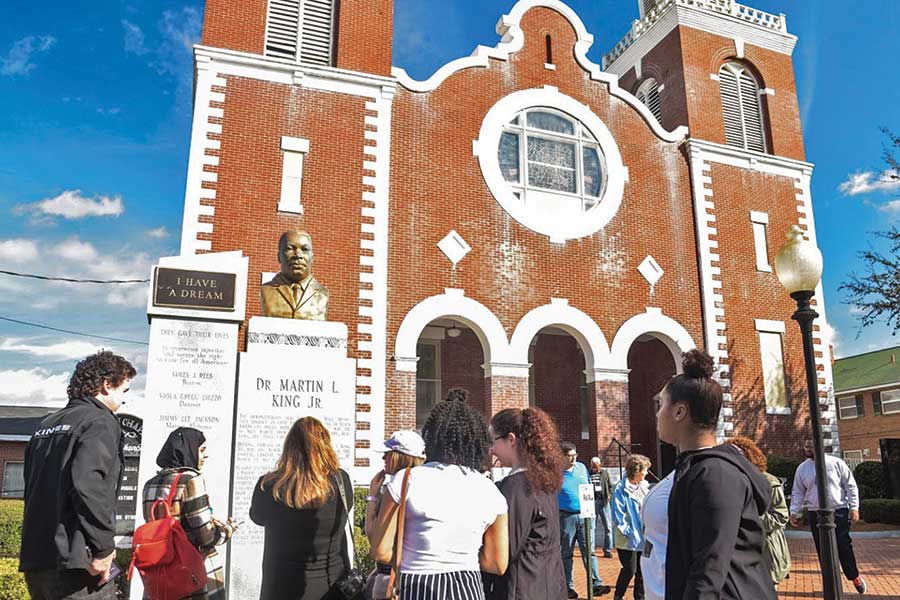LEARNING BY DOING
In the Name of our Founders
Solidarity and Social Justice retreats let students examine their own purpose by confronting challenging issues.
by Joanie Eppinga

A visit to the Brown Chapel AME Church in Selma (Ala.).
Ask Sarah Schuler '20 why she's gone on four Solidarity and Social Justice retreats, and she answers immediately. "They're so hard-hitting," she says. "You're talking to people firsthand. It stokes a flame in me."
That's the intention behind the SSJ retreats, named in honor of Nazareth's founders, the Sisters of Saint Joseph. The Sisters strove to help the disenfranchised and support their community — commitments Nazareth students share and which deepen on the retreats.
Each retreat highlights a current social justice issue. The Civil Rights Journey takes students to historical sites in the South to talk with people who lived through landmark events like Bloody Sunday in Selma. In Puerto Rico, students learn about structural injustice and disaster recovery. The Border Immersion trip to El Paso and Juarez lets students hear stories of migrants at the border, and of those who help them. The March: Bearing Witness to Hope retreat takes students to once-thriving Jewish cultural centers and to death camps in Germany and Poland. At the St. Francis Inn in Philadelphia, students speak with people who are experiencing homelessness.
According to Diane Ariza, Ph.D., vice president for Community and Belonging and lead staff member for the Puerto Rico trip, on these retreats students don't engage as actively as on service trips. Instead, they listen, contemplate, and then take what they learned back to their community and their professions. Ariza notes that the retreats "empower our students to use their personal and professional interests to address the needs of the Nazareth campus and our society."
Interest in the retreats has grown steadily. That makes sense, says Jamie Fazio '97, Catholic chaplain and director of the Center for Spirituality, who directs many of the retreats, because "Nazareth students are here not just for a degree, but out of a desire to be profoundly engaged." Susan Nowak '77, Ph.D., S.S.J., a professor of religious studies, agrees that the retreats fill a need. "The students have a desire to build meaning into their lives," she says. "These retreats help them answer the question: What is your purpose?"
That question has become pivotal in the life of Shaun Moore Jr. '21, who, before going on the Puerto Rico retreat, already knew it was important to stay in his community. But Shaun says that his "world flipped upside down" when an activist on the island said, "We don't stay just to stay — we stay to improve." That "single sentence," Shaun says, "has made me constantly consider how I could have this same effect at home."
Being in these settings fuels that purpose. Sarah Jackson '16, '19G, discovered on the Civil Rights retreat that "you can't learn how those things affect you until you personally confront them." Nancy Garcia '21, who went on the Border trip, agrees: "Once you're there, you realize these are real people and these things are affecting them right now."
That real-world element makes the trips powerful. "Because I got to see it with my own eyes, it wasn't just history — it was a fact," says Ritsel Decena Soriano '21, who traveled to Puerto Rico. "I could feel it, see it, touch it." That combination of immediacy and empathy, the students agree, is the compelling factor that moves solidarity and social justice forward — both out in the world, and back at home.
Joanie Eppinga is a writer and editor in Madison, Wisc.